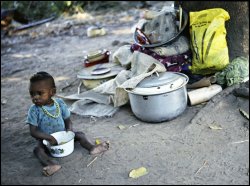Teresa Sancristóval, Doctors Without Borders/Médecins Sans Frontières (MSF) head of mission in Bangui, Central African Republic, speaks about the situation in the country.
|
– Teresa Sancristóval |

Around 30,000 refugees who fled violence in northern Central African Republic are living in three refugee camps around the little village of Goré in southern Chad. They fled their homes as result of fighting between government troops and various rebel groups. Civilians, suspected of supporting one side or the other, have been targeted or caught in the crossfire of the violence. Photo © Philipp Horak/Anzenberger |
Over the last few months, the Central African Republic has plunged into crisis. What is the situation today?
Since November 2005, various rebel groups have appeared in the northwest region of the country, in the Ouham and Ouham Pendé prefectures. Since then, the civilian population has been subject to considerable abuse, beginning in the Paoua region, expanding to the area around Markounda and, more recently, in the Kabo region. Rebel groups, the Central African army and armed bandits–known locally as "coupeurs de routes"–are operating throughout the area. The population has been subjected to a host of violent acts. Civilians have been stigmatized by the conflicting groups, which accuse them of supporting their opponent. As a result, many villages have been burned and looted and populations have been displaced. In addition, the "coupeurs de route" continue their traditional violent activities, which involve theft, ransom and, sometimes, holding civilians. In October, tensions also increased in the northeastern part of the country; a new rebel group appeared and quickly seized Birao and other towns. The government managed to regain control of the region only in the last few weeks. The rest of the country is not particularly affected by these conflicts. However, it is experiencing the economic crisis that has affected the CAR since the late 1990s.

Around the village of Markounda, in the northern part of the Central African Republic's Ouham district, MSF runs mobile clinics. Photo © Ton Koene |
How has the violence affected the civilian population?
A large part of the Ouham and Ouham Pendé population has been displaced. Tens of thousands of people are hiding in the bush in extremely precarious conditions, with no protection from violence. They are dispersed, living in makeshift shelters without water and in fear of new attacks. Many health centers were looted and most of the displaced persons do not have access to health care. In addition, families in some areas are beginning to lose their means of subsistence because they have been unable to farm this year. Children no longer attend school. We are witnessing a gradual impoverishment and a worsening of living conditions among this population.
Are the populations receiving aid?
In general, the Central African Republic constitutes a forgotten country in the eyes of the international community. There is almost no information coming out on the current situation. International organizations have a very limited presence there. For example, in the Kabo region and in Batangafo, MSF is the only group still in the field after violence increased in August. In addition, given that social indicators are already very poor–with the majority of the population lacking access to health care–it is fair to say that the international community is not paying enough attention to the country.
What is MSF doing in this context?
MSF is working in five towns in the northwest. We support the local hospital and send mobile clinics to surrounding areas to provide assistance to the displaced populations. We have also conducted occasional distributions of basic supplies. However, the violence has affected our work, too. "Coupeurs de route" have attacked MSF teams several times. There is a general climate of insecurity in the region resulting from the confrontations between rebel groups and the army. We have had to suspend our mobile clinic activities several times to avoid putting our teams and, in particular, the civilian populations in danger. In addition, throughout November, the authorities blocked humanitarian aid access to the new conflict zones further east.
Last week, MSF finally managed to gain access to that area in the northeast. What did our teams find there?
It's still too early to draw any conclusions. Based on our initial evaluations in Birao and Ndélé, there has not been heavy fighting in the towns there. Civilians did flee and are beginning to return and economic activity is resuming. Up to now, we have only been able to assess the needs in the towns. We don't yet know the situation in the rural areas. In general, it is clear that the health system is very fragile and cannot meet the population's needs, but the situation is similar throughout most of the country. One of the specific characteristics of the northeast is that it is one of the country's least populated and most isolated regions. For six months of the year, it's impossible to get there by road.




